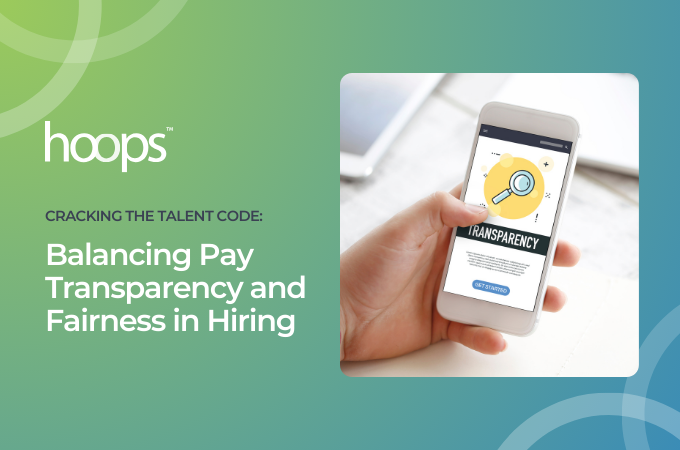In the digital era, businesses have quickly realized the potential of social media platforms as valuable tools in their recruitment arsenal. The rapid expansion and adoption of social media have revolutionized the way companies approach hiring and employee engagement. An effective social media recruiting strategy not only allows organizations to tap into a broader pool of potential candidates but also offers a platform to showcase their unique company culture, values, and employee experiences.
In this post, we'll be looking at the following:
- Getting Social Media Recruiting Right
- Understanding the Legal Implications of Social Media Recruiting
- Effective Social Media Platforms and Content for Recruitment
- Monitoring and Responding to Employee Reviews
- Attracting Passive Candidates Through Social Media
- Optimizing Social Media Recruitment for Better ROI
 As organizations increasingly rely on social media for recruitment purposes, they must also navigate the legal implications and privacy concerns associated with these practices. This requires striking a delicate balance between maintaining a positive company image and respecting the rights of both job applicants and current employees. In addition, it is essential to identify the most effective platforms and content types that resonate with the target audience and align with the company's overall recruiting objectives.
As organizations increasingly rely on social media for recruitment purposes, they must also navigate the legal implications and privacy concerns associated with these practices. This requires striking a delicate balance between maintaining a positive company image and respecting the rights of both job applicants and current employees. In addition, it is essential to identify the most effective platforms and content types that resonate with the target audience and align with the company's overall recruiting objectives.
Social media has also emerged as a powerful channel for attracting passive candidates, who may not be actively seeking new opportunities but could be enticed by a company's appealing online presence. By leveraging social media to showcase employee accomplishments and recognition, businesses can foster an attractive employer brand that appeals to a wide range of potential candidates.
Ultimately, optimizing social media recruitment strategies is key to improving return on investment (ROI) in the hiring process. As companies shift away from traditional advertising methods, they can enjoy greater control over lead generation and recruitment efforts, enabling them to make data-driven decisions and refine their approach for maximum impact.
In the following article, we will delve deeper into the various facets of social media recruiting strategies, exploring best practices, legal considerations, and emerging trends that are shaping the future of talent acquisition in the digital age.
1. Getting Social Media Recruiting Right
To create a successful social media recruiting strategy, it is crucial to identify the platforms and content types that resonate with your target audience. Different industries and job roles may attract diverse demographics, making it essential to focus your efforts on the platforms where your potential candidates are most active.
 For example, a recent report highlighted a significant shift in truck driver recruiting efforts towards social media, with platforms like Instagram and Facebook seeing remarkable increases in driver leads. The study found that video content, particularly vertical video ad formats, were among the fastest-growing lead generators in the industry.
For example, a recent report highlighted a significant shift in truck driver recruiting efforts towards social media, with platforms like Instagram and Facebook seeing remarkable increases in driver leads. The study found that video content, particularly vertical video ad formats, were among the fastest-growing lead generators in the industry.
Understanding your target audience's preferences is essential to tailoring your content and maximizing engagement. For instance, job seekers in the tech industry might be more active on platforms like LinkedIn or Twitter, while creative professionals could prefer visual-centric platforms like Instagram or Pinterest.
In addition to selecting the right platforms, it is crucial to create content that genuinely engages potential candidates. According to Priscilla Peters, vice president of marketing and training at Conversion Interactive Agency, "The best-performing content isn't necessarily recruiting-type content. It's not that a driver necessarily wants to hear about every job opening you have. They want to see how you treat your other drivers and what's going on at your carrier."
To create engaging content, consider the following tips:
- Showcase your company culture: Share images, videos, or stories that demonstrate your organization's values, work environment, and the experiences of current employees. This helps potential candidates visualize themselves as part of your team and understand the company culture they can expect.
- Highlight employee achievements: Regularly recognize and praise your employees' accomplishments, both professionally and personally. This not only boosts employee morale but also signals to potential candidates that your company values and rewards its staff.
- Offer valuable information: Share industry news, insights, or helpful tips that are relevant to your target audience. This demonstrates your organization's expertise and commitment to the professional development of its employees.
- Use a variety of content formats: Experiment with different content types, such as videos, images, infographics, or blog posts, to see which formats resonate most with your audience. This can help you fine-tune your content strategy and maintain engagement over time.
When crafting your content, remember that transparency and authenticity are key. Candidates appreciate an honest representation of your company and are more likely to trust and engage with your brand if they feel the content is genuine.
In addition to creating engaging content, it is essential to monitor and respond to any feedback or inquiries from potential candidates on your social media channels.
The Professional Drivers Agency's 2022 Recruiting & Retention Annual Report noted that 71.6% of drivers said reviews influenced them the most when choosing a carrier. By acknowledging and addressing any concerns or questions promptly, you demonstrate your organization's commitment to open communication and customer service.
Finally, it is important to analyze the performance of your social media recruitment efforts continually. Regularly reviewing your engagement metrics, lead generation, and conversion rates can help you identify areas for improvement and refine your strategy for maximum impact.
In the next section, we will explore the legal implications and privacy concerns associated with social media recruiting, providing guidance on how to navigate these challenges while maintaining a positive company image and respecting the rights of job applicants and employees.
2. Understanding the Legal Implications of Social Media Recruiting
 As you develop your social media recruiting strategy, it's essential to be aware of the legal implications and privacy concerns that may arise. In this section, we will discuss California's AB 1844 and its impact on employer practices, as well as how to balance privacy concerns with the need to maintain a positive company image.
As you develop your social media recruiting strategy, it's essential to be aware of the legal implications and privacy concerns that may arise. In this section, we will discuss California's AB 1844 and its impact on employer practices, as well as how to balance privacy concerns with the need to maintain a positive company image.
California's AB 1844 and its Impact on Employer Practices
In 2012, California passed Assembly Bill 1844 (AB 1844), which restricts employers from requesting or requiring access to an employee's or job applicant's personal social media accounts. This legislation was enacted to protect the privacy rights of employees and job applicants, ensuring that their personal social media activity remains separate from their professional lives.
Under AB 1844, employers are prohibited from:
- Asking employees or job applicants for their social media usernames or passwords;
- Requiring employees or job applicants to access their personal social media accounts in the presence of the employer;
- Requiring employees or job applicants to divulge any personal social media content.
Employers who violate these provisions may face legal consequences, including fines and potential lawsuits. It's crucial for organizations to comply with these regulations and respect the privacy rights of employees and job applicants during the recruitment process.
Balancing Privacy Concerns with the Need to Maintain a Positive Company Image
When using social media for recruiting purposes, it's important to strike a balance between respecting candidates' privacy and maintaining your organization's positive image. Here are some best practices to consider:
- Focus on publicly available information: When assessing a candidate's social media presence, limit your review to information that is publicly available. Do not attempt to gain access to private accounts, as this may violate privacy laws and damage your company's reputation.
- Develop a clear social media recruiting policy: Establish guidelines for your recruitment team that outline the appropriate use of social media during the hiring process. This policy should include information on what types of social media content can be considered during the hiring process and how to handle any potential legal or ethical concerns that may arise.
- Avoid discrimination: When reviewing social media profiles, be cautious not to make hiring decisions based on protected characteristics, such as race, gender, religion, or age. Discrimination in hiring practices is illegal and can result in costly lawsuits and damage to your company's reputation.
- Train your recruitment team: Ensure that your recruitment team is well-versed in the legal and ethical considerations of social media recruiting. Providing ongoing training and resources can help your team navigate the complexities of social media recruiting while minimizing potential risks.
- Document your decision-making process: Keep detailed records of your recruitment process, including the reasons for selecting or rejecting candidates. This documentation can provide valuable insight into your hiring practices and help protect your organization in the event of a legal dispute.
By understanding the legal implications of social media recruiting and implementing best practices, you can minimize potential risks while effectively leveraging the power of social media to attract top talent.
In the next section, we will discuss the platforms available that can enhance your recruiting process and the kinds of content that are most effective on each.
3. Effective Social Media Platforms and Content for Recruitment
To create a successful social media recruiting strategy, it's essential to select the right platforms and create engaging content that appeals to potential candidates. In this section, we'll discuss the rise of Instagram, Facebook Stories, and vertical video ad formats for driver recruitment, the importance of focusing on company culture and values, and the need for informative content to attract top talent.
 The Rise of Instagram, Facebook Stories, and Vertical Video Ad Formats for Driver Recruitment
The Rise of Instagram, Facebook Stories, and Vertical Video Ad Formats for Driver Recruitment
In recent years, platforms like Instagram and Facebook Stories have gained significant traction for recruiting purposes, particularly in the trucking industry. According to the Recruiting & Retention Annual Report referenced earlier, driver leads from Instagram soared by 324% year-over-year, while leads from Facebook stories grew by 165% from the prior year. Vertical video ad formats were identified as the fastest-growing driver lead generator in 2022. These platforms allow organizations to share visually engaging content that resonates with potential candidates, increasing the likelihood of capturing their attention and interest.
Focusing on Company Culture and Values Instead of Just Job Openings
Rather than merely posting about job openings, it's crucial to showcase your company's culture and values through your social media content. As industry business adviser Josh Lovan explains, younger generations, especially millennials, care deeply about social values and environmental sustainability. They want to know what sets your organization apart and how you treat your current employees. By emphasizing your company's unique culture, you can connect with potential candidates on a deeper level and foster a sense of belonging before they even apply.
Importance of Engaging and Informative Content to Attract Potential Candidates
To effectively leverage social media for recruitment, it's essential to create engaging and informative content that speaks to potential candidates. Priscilla Peters, vice president of marketing and training at Conversion Interactive Agency, notes that the best-performing content isn't necessarily recruiting-type content. Instead, candidates want to learn about how your company treats its employees and what's happening within the organization.
To create compelling content, consider showcasing employee stories, company events, or highlighting the accomplishments of your current workforce. By offering a glimpse into the daily life of your employees and celebrating their achievements, you can create an authentic and relatable narrative that attracts potential candidates to your organization.
As we move into the next section, we'll explore the importance of monitoring and addressing employee reviews on social media, and how doing so can positively impact your recruiting strategy.
4. Monitoring and Responding to Employee Reviews
In this section, we will discuss the significance of monitoring and responding to employee reviews on social media platforms. Employee reviews can have a considerable impact on potential candidates' decision-making processes and play a crucial role in shaping a company's image. By being attentive to current employees' experiences and feedback, organizations can improve their recruitment efforts and maintain a positive company culture.
 The Impact of Employee Reviews on the Decision-Making Process of Candidates
The Impact of Employee Reviews on the Decision-Making Process of Candidates
Employee reviews on social media and review platforms can greatly influence potential candidates' perceptions of a company. As mentioned, 71.6% of drivers said that such reviews impacted them the most when choosing a carrier. This statistic emphasizes the importance of paying attention to what current employees have to say about their experiences with a company. Candidates often consider these reviews a reliable source of information, helping them decide whether or not to apply for a position at a particular organization.
Importance of Being Attentive to Current Employees' Experiences and Feedback
Being attentive to current employees' experiences and feedback not only helps organizations maintain a positive image, but it also aids in identifying areas that may require improvement. By addressing the concerns raised in employee reviews, companies can demonstrate their commitment to fostering a supportive and healthy work environment.
Moreover, actively responding to reviews and engaging with employees can have a positive effect on both current and potential team members. It shows that the organization values open communication and is willing to address issues as they arise. This level of transparency can foster trust and encourage potential candidates to consider joining the company.
To effectively monitor and respond to employee reviews, organizations should have a designated team or individual responsible for tracking reviews on various platforms. This person or team should be prepared to address both positive and negative feedback in a professional and constructive manner. By acknowledging employee concerns and taking steps to address them, companies can create a positive feedback loop that strengthens their employer brand and appeals to top talent.
As we continue to the next section, we will explore strategies for attracting passive candidates through social media, further enhancing the effectiveness of a company's recruitment efforts.
5. Attracting Passive Candidates Through Social Media
 In this section, we will discuss the importance of using social media to reach passive candidates who may not be actively seeking new job opportunities. By showcasing employee accomplishments and recognition on social media platforms, companies can create a compelling employer brand that attracts top talent, including those who may not be actively searching for a new position.
In this section, we will discuss the importance of using social media to reach passive candidates who may not be actively seeking new job opportunities. By showcasing employee accomplishments and recognition on social media platforms, companies can create a compelling employer brand that attracts top talent, including those who may not be actively searching for a new position.
Reaching Candidates Who Are Not Actively Searching for a Job
Traditional job boards and recruitment channels typically cater to active job seekers who are actively applying for new positions. However, passive candidates are often high-quality candidates who may not be actively looking for new opportunities but could still be open to a change if the right offer comes along. Social media offers an effective way to reach these passive candidates by allowing companies to share content that showcases their culture, values, and successes.
According to Matthew Carr, vice president of operations at CPC Logistics, passive candidates are not usually found on job boards. Instead, they spend the majority of their time engaging with content on social media platforms. By sharing content that resonates with these individuals, companies can tap into a pool of potential candidates that may not be accessible through traditional recruitment methods.
Importance of Showcasing Employee Accomplishments and Recognition on Social Media
One effective way to attract passive candidates is by highlighting employee accomplishments and recognition on social media. As industry business adviser Josh Lovan points out in the same article, successful companies have figured out how to recognize and praise their employees on social media, leading to increased traction in their recruitment efforts.
Sharing stories of employee success and celebrating their accomplishments can help create a positive image of the company and its culture. This type of content not only appeals to potential candidates but also helps current employees feel valued and motivated. By showcasing the achievements of their team members, companies can demonstrate their commitment to employee growth and development, making them more attractive to both active and passive candidates.
To effectively showcase employee accomplishments, organizations should consistently share stories of success, recognition, and milestones on their social media channels. These posts can include employee promotions, awards, completed projects, or any other noteworthy achievements. By doing so, companies can create a compelling narrative that showcases their commitment to employee success and fosters a sense of pride among current team members.
Next, we'll delve into strategies for optimizing social media recruitment efforts to achieve a better return on investment (ROI) and maximize the effectiveness of a company's recruitment strategy.
6. Optimizing Social Media Recruitment for Better ROI
In this final section, we will explore how companies can optimize their social media recruitment efforts to achieve a better return on investment (ROI). This includes moving towards greater control over recruitment and lead generation, as well as shifting from traditional advertising methods to more targeted and trackable social media campaigns.
 Moving Towards Greater Control Over Recruitment and Lead Generation
Moving Towards Greater Control Over Recruitment and Lead Generation
One significant trend in social media recruitment is the shift towards greater control over recruitment processes and lead generation. As noted by Doug Campbell, Colling President, carriers are increasingly seeking more control over their recruitment efforts to improve their ROI. This involves reducing reliance on buying leads from vendors and focusing on generating their own leads and connections.
Companies can achieve this by developing their own assets, such as websites, social media feeds, and other channels. By controlling these assets, organizations can ensure a more personalized and targeted approach to recruitment, ultimately leading to better results. This approach enables potential candidates to come into the recruitment process with a better understanding of the company they are considering, which in turn, can lead to higher-quality leads and improved candidate retention.
Shifting from Traditional Advertising to Targeted, Trackable Social Media Campaigns
Another crucial aspect of optimizing social media recruitment for better ROI is the transition from traditional advertising methods, such as television, radio broadcasts, and billboards, to targeted and trackable social media campaigns. Traditional advertising methods cast a wide net, making it difficult to fully track their effectiveness. Social media, on the other hand, allows for more precise targeting and tracking, enabling companies to better understand their campaigns' performance and make data-driven decisions.
Doug Campbell highlights the impact of social media in recruitment, emphasizing that it can effectively deliver broad messages while still providing the ability to drive trackable clicks through lead forms. This level of control and trackability helps companies optimize their recruitment efforts and allocate resources more efficiently, ultimately improving their ROI.
In conclusion, a well-executed social media recruitment strategy is essential for organizations looking to attract top talent in today's competitive job market. By understanding the legal implications of social media recruiting, leveraging effective platforms and content, monitoring and responding to employee reviews, attracting passive candidates, and optimizing social media recruitment for better ROI, companies can harness the full potential of social media to achieve their recruitment goals.
Looking to develop a winning social media recruitment strategy or need assistance with anything else discussed in this post? Consider Hoops HR for expert guidance and support. Our team of professionals can help you navigate the complexities of social media recruitment and ensure you're making the most of this powerful tool in your quest for top talent.







